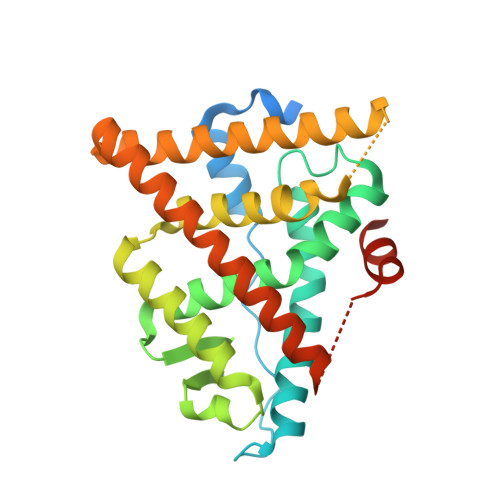Discovery of GNE-149 as a Full Antagonist and Efficient Degrader of Estrogen Receptor alpha for ER+ Breast Cancer.
Liang, J., Blake, R., Chang, J., Friedman, L.S., Goodacre, S., Hartman, S., Ingalla, E.R., Kiefer, J.R., Kleinheinz, T., Labadie, S., Li, J., Lai, K.W., Liao, J., Mody, V., McLean, N., Metcalfe, C., Nannini, M., Otwine, D., Ran, Y., Ray, N., Roussel, F., Sambrone, A., Sampath, D., Vinogradova, M., Wai, J., Wang, T., Yeap, K., Young, A., Zbieg, J., Zhang, B., Zheng, X., Zhong, Y., Wang, X.(2020) ACS Med Chem Lett 11: 1342-1347
- PubMed: 32551022
- DOI: https://doi.org/10.1021/acsmedchemlett.0c00224
- Primary Citation of Related Structures:
6WOK - PubMed Abstract:
Estrogen receptor alpha (ER¦Á) is a well-validated drug target for ER-positive (ER+) breast cancer. Fulvestrant is FDA-approved to treat ER+ breast cancer and works through two mechanisms-as a full antagonist and selective estrogen receptor degrader (SERD)-but lacks oral bioavailability. Thus, we envisioned a "best-in-class" molecule with the same dual mechanisms as fulvestrant, but with significant oral exposure. Through lead optimization, we discovered a tool molecule 12 (GNE-149) with improved degradation and antiproliferative activity in both MCF7 and T47D cells. To illustrate the binding mode and key interactions of this scaffold with ER¦Á, we obtained a cocrystal structure of 6 that showed ionic interaction of azetidine with Asp351 residue. Importantly, 12 showed favorable metabolic stability and good oral exposure. 12 exhibited antagonist effect in the uterus and demonstrated robust dose-dependent efficacy in xenograft models.
Organizational Affiliation:
Genentech, Inc., 1 DNA Way, South San Francisco, California 94080, United States.
















